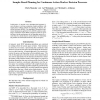157
click to vote
CORR
2012
Springer
13 years 9 months ago
2012
Springer
Reinforcement learning addresses the dilemma between exploration to find profitable actions and exploitation to act according to the best observations already made. Bandit proble...
149
click to vote
ALT
2011
Springer
14 years 2 months ago
2011
Springer
This paper studies the deviations of the regret in a stochastic multi-armed bandit problem. When the total number of plays n is known beforehand by the agent, Audibert et al. (2009...
165
Voted
AIPS
2011
14 years 5 months ago
2011
In this paper, we present a new algorithm that integrates recent advances in solving continuous bandit problems with sample-based rollout methods for planning in Markov Decision P...
116
click to vote
COGSR
2011
14 years 9 months ago
2011
In bandit problems, a decision-maker must choose between a set of alternatives, each of which has a fixed but unknown rate of reward, to maximize their total number of rewards ov...
134
click to vote
COLT
2010
Springer
14 years 11 months ago
2010
Springer
We consider a bandit problem which involves sequential sampling from two populations (arms). Each arm produces a noisy reward realization which depends on an observable random cov...
CDC
2008
IEEE
15 years 8 months ago
2008
IEEE
—We consider a multiarmed bandit problem where the expected reward of each arm is a linear function of an unknown scalar with a prior distribution. The objective is to choose a s...
127
click to vote
Publication
Abstract: Several approximate policy iteration schemes without value functions, which focus on policy representation using classifiers and address policy learning as a supervis...
193
click to vote
Publication
Several researchers have recently investigated the connection between reinforcement learning and classification. We are motivated by proposals of approximate policy iteration schem...

